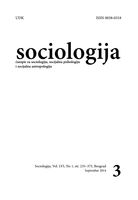Očuvanje zaposlenosti putem radničkog samoupravljanja: slučaj oporavljenih preduzeća u Argentini
Keeping on Employment Through Workers’ SelfManagement: the Case of the Argentinian Empresas Recuperadas
Author(s): Slobodan P. Cvejić, Irena PetrovićSubject(s): Social Sciences
Published by: Sociološko naučno društvo Srbije
Keywords: Argentina’s worker-recovered factories; self-management; economic crisis; legal and institutional framework
Summary/Abstract: The phenomenon of ERTs in Argentina (Empresas recuperadas por sus trabajadores) gains popularity from the financial crisis years of 1999–2002. The resulting drastic fall in gross national product, high rates of inflation, increased levels of unemployment, poverty etc., reflected the severe weaknesses and limitations of the neoliberal institutions in Argentina. This phenomenon was also determined by specific historical patterns, such as the state interventionism, a long tradition of trade unionism and workers’ struggles as well as a long and extensive tradicion of cooperativism. According to the latest survey, there are more than 300 ERT in Argentina (311), employing over 13.000 workers. (Ruggeri et al 2014). The survey results show that 95% of the ERT are self-organized under the organizational and legal framework of workers’ cooperatives. The main objective of this paper is to provide a political economic and social overview of the rise and establishment of ERTs in Argentina over the past two decades. Moreover, the legal and institutional preconditions that significantly encourage, limit, and condition the scope of workers’ cooperatives, will be analyzed. In this analysis we will rely on the results of research on ERT that have been done in last 10 years, as well as on historical analysis of legal and institutional framework.
Journal: Sociologija
- Issue Year: 56/2014
- Issue No: 3
- Page Range: 239-264
- Page Count: 26
- Language: Serbian

